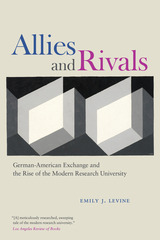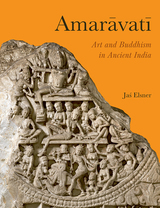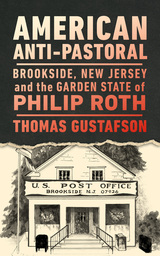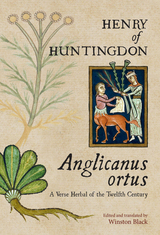

When does imitation of an author morph into masquerade? Although the Roman writer Ovid died in the first century CE, many new Latin poems were ascribed to him from the sixth until the fifteenth century. Like the Appendix Vergiliana, these verses reflect different understandings of an admired Classical poet and expand his legacy throughout the Middle Ages.
The works of the “medieval Ovid” mirror the dazzling variety of their original. The Appendix Ovidiana includes narrative poetry that recounts the adventures of both real and imaginary creatures, erotic poetry that wrestles with powerful desires and sexual violence, and religious poetry that—despite the historical Ovid’s paganism—envisions the birth, death, and resurrection of Christ.
This is the first comprehensive collection and English translation of these pseudonymous medieval Latin poems.
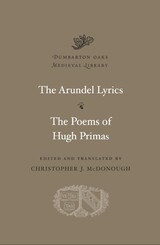
This volume presents two complementary medieval anthologies containing lyrics by two outstanding Latin poets of the second half of the twelfth century. The poet Peter of Blois was proclaimed by a contemporary of his to be a master composer of rhythmic verse. Peter’s secular love-lyrics gathered in the Arundel manuscript give substance to that claim. Written with a technical virtuosity that rivals the metrical display of Horatian lyric, the poems give eloquent and learned expression to the cult of secular love that emerged in the twelfth century.
The collection is further augmented by verse as varied as Christmas poems and satires on the venality of the Roman Curia and immoral bishops, including a famous lament about church corruption by Walther of Châtillon.
The cleric Hugh Primas won recognition and fame for compositions in which he reflects upon his experiences, good and bad, while traveling around the cities of northern France (such as the important sees of Rheims and Sens) in search of patronage. Artistic in conception and execution, the poems are memorable for the witty and often acerbic tone with which Primas engages the holders of ecclesiastical power.

The Cambridge Songs, from the Latin Carmina Cantabrigiensia, is the most important anthology of songs from before the thirteenth-century Carmina Burana. It offers the only major surviving anthology of Latin lyric poems from between Charlemagne and the Battle of Hastings. It contains panegyrics and dirges, political poems, comic tales, religious and didactic poems, and poetry of spring and love. Was it a school book for students, or a songbook for the use of professional entertainers? The greatest certainty is that the poems were composed in the learned language, and that they were associated with song. The collection is like the contents of an eleventh-century jukebox or playlist of top hits from more than three centuries.
This edition and translation comprises a substantial introduction, the Latin texts and English prose in carefully matched presentation, and extensive commentary, along with appendices, list of works cited, and indices.

Carmina Burana, literally “Songs from Beuern,” is named after the village where the manuscript was found. The songbook consists of nearly 250 poems, on subjects ranging from sex and gambling to crusades and corruption. Compiled in the thirteenth century in South Tyrol, a German-speaking region of Italy, it is the largest surviving collection of secular Medieval Latin verse and provides insights into the vibrant social, spiritual, and intellectual life of the Middle Ages. The multilingual codex includes works by leading Latin poets such as the Archpoet, Walter of Châtillon, and the canonist Peter of Blois, as well as stanzas by German lyric poets. More than half these poems are preserved nowhere else.
A selection from Carmina Burana first appeared in Victorian England in 1884 under the provocative title Wine, Women and Song. The title Carmina Burana remains fixed in the popular imagination today, conjured vividly by Carl Orff’s famous cantata—no Medieval Latin lyrics are better known throughout the world. This new presentation of the medieval classic in its entirety makes the anthology accessible in two volumes to Latin lovers and English readers alike.

Carmina Burana, literally “Songs from Beuern,” is named after the village where the manuscript was found. The songbook consists of nearly 250 poems, on subjects ranging from sex and gambling to crusades and corruption. Compiled in the thirteenth century in South Tyrol, a German-speaking region of Italy, it is the largest surviving collection of secular Medieval Latin verse and provides insights into the vibrant social, spiritual, and intellectual life of the Middle Ages. The multilingual codex includes works by leading Latin poets such as the Archpoet, Walter of Châtillon, and the canonist Peter of Blois, as well as stanzas by German lyric poets. More than half these poems are preserved nowhere else.
A selection from Carmina Burana first appeared in Victorian England in 1884 under the provocative title Wine, Women and Song. The title Carmina Burana remains fixed in the popular imagination today, conjured vividly by Carl Orff’s famous cantata—no Medieval Latin lyrics are better known throughout the world. This new presentation of the medieval classic in its entirety makes the anthology accessible in two volumes to Latin lovers and English readers alike.
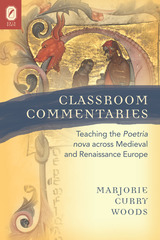
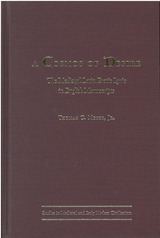
Thomas C. Moser, Jr. explores the fascinating body of medieval Latin erotic poetry found in English manuscripts. His study describes the intellectual and social context from which the great erotic songs of the twelfth century emerged, and examines a variety of erotic poems, from school exercises to the magnificent lyrics found in Arundel 384. He also illuminates the influence of neoplatonic philosophy on this poetry, explicating key neoplatonic texts and applying that analysis in close readings of erotic lyrics from the same period and milieu.
A Cosmos of Desire will interest scholars of medieval literature as well as specialists in Latin poetry and philosophy. Students of Middle English literature will find that it fills an important gap in our understanding of English intellectual life between the twelfth and the fourteenth century. All Latin prose and poetry is translated, some works for the first time, and the book is generously illustrated with photographs of the manuscripts discussed.
Thomas C. Moser, Jr. is Associate Professor of English at the University of Maryland, College Park.

A renowned Renaissance poet’s homage to Naples makes its debut in modern English translation.
Giovanni Pontano (1429–1503), whose academic name was Gioviano, was one of the great scholar-poets of the Renaissance as well as a leading statesman who served as prime minister to the Aragonese kings of southern Italy. The dominant literary figure of quattrocento Naples, Pontano produced literary works in several genres and was the leader of the Neapolitan academy. The two works included in the present volume, broadly inspired by Virgil, might be considered Pontano’s love songs to the landscapes of Naples. The Eclogues offer a spectacular, panoramic tour of the Bay of Naples region, even as they focus on intimate domestic scenes and allegorize the people and places of the poet’s world. The Garden of the Hesperides is a work of brilliant erudition on an unprecedented poetic topic: the cultivation of citrus trees and the splendid pleasures of gardens. This volume features a newly established Latin text of the Garden of the Hesperides as well as the first published translations of both works into English.
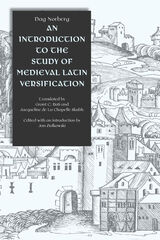


The Tria sunt, named for its opening words, was a widely used and highly ambitious book composed in England in the late fourteenth century during a revival of interest in the art of poetry and prose.
The backbone of this comprehensive guide to writing Latin texts is the wealth of illustrative and instructive sources compiled, including examples from classical authors such as Cicero and Horace as well as from medieval literature, and excerpts from other treatises of the same period by authors from Matthew of Vendôme through Gervase of Melkley. Topics treated at length include methods for beginning and ending a composition, techniques for expanding and abbreviating a text, varieties of figurative language, attributes of persons and actions, and the art of letter writing.
This anonymous treatise, related especially closely to work by Geoffrey of Vinsauf, served as a textbook for rhetorical composition at Oxford. Of all the major Latin arts of poetry and prose, it is the only one not previously edited or translated into English.

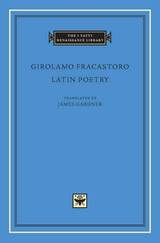


Pietro Bembo (1470-1547), scholar and critic, was one of the most admired Latinists of his day. After some years at the court of Urbino, where he exchanged Platonic love letters with Lucrezia Borgia, he moved to Rome and served as secretary to Leo X (1513-1520). Later he retired to Padua and a life of letters. He was made a cardinal in 1539. The poems in this volume come from all periods of his life and reflect both his erudition and his wide-ranging friendships. This verse edition is the first time they have been translated into English.
This volume also includes the prose dialogue Etna, an account of Bembo's ascent of Mt. Etna in Sicily during his student days, translated by Betty Radice.
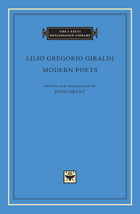
Born in Ferrara, Lilio Gregorio Giraldi (1479–1552) received an excellent classical education at the world-famous humanist schools of his native city. On his various travels in search of a patron, he visited Naples, frequenting the Academy there; Mirandola, where he entered the service of Gianfrancesco Pico; Milan, where he studied Greek under Demetrius Chalcondyles; and Rome, where he enjoyed the munificence of Pope Leo X. Following the sack of Rome in 1527, Giraldi eventually made his way back to Ferrara, where he spent the last years of his life.
Giraldi was the author of many works on literary history, mythology, and antiquities. Among the most famous are his dialogues, translated here into English for the first time. Modeled on Cicero’s Brutus, the work discusses hundreds of contemporary neo-Latin and vernacular poets, giving a panoramic view of European poetry in the late fifteenth and early sixteenth century from Great Britain to Greece, but concentrating above all on Italy.


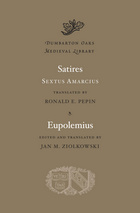
Composed in Germany by a monastic poet steeped in classical lore and letters, the Satires of Amarcius (Sextus Amarcius Gallus Piosistratus) unrelentingly attack both secular vices and ecclesiastical abuses of the late eleventh century. The verses echo Horace and Prudentius, are laced with proverbs and polemic, and portray vividly aspects of contemporary life—the foppery of young nobles, the vainglory of the nouveaux riches, the fastidiousness of debauched gluttons. This is the first English translation of the Satires.
The Eupolemius is a late-eleventh-century Latin epic that recasts salvation history, from Lucifer’s fall through Christ’s resurrection. The poem fuses Greek and Hebrew components within a uniquely medieval framework. At once biblical, heroic, and allegorical, it complements the so-called Bible epics in Latin from late antiquity and the refashionings of biblical narrative in Old English verse. It emulates classical Latin epics by Virgil, Lucan, and Statius and responds creatively to the foundational personification allegory by the Christian poet Prudentius. The poem was composed by an anonymous German monk, possibly the author who used the pseudonym Amarcius. Although it focuses on events of both the Hebrew Bible and New Testament, it is also rooted in its own momentous times.
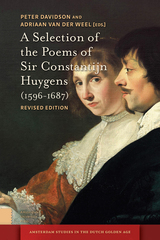
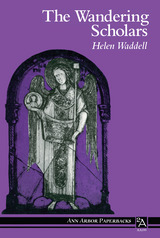
READERS
Browse our collection.
PUBLISHERS
See BiblioVault's publisher services.
STUDENT SERVICES
Files for college accessibility offices.
UChicago Accessibility Resources
home | accessibility | search | about | contact us
BiblioVault ® 2001 - 2024
The University of Chicago Press



